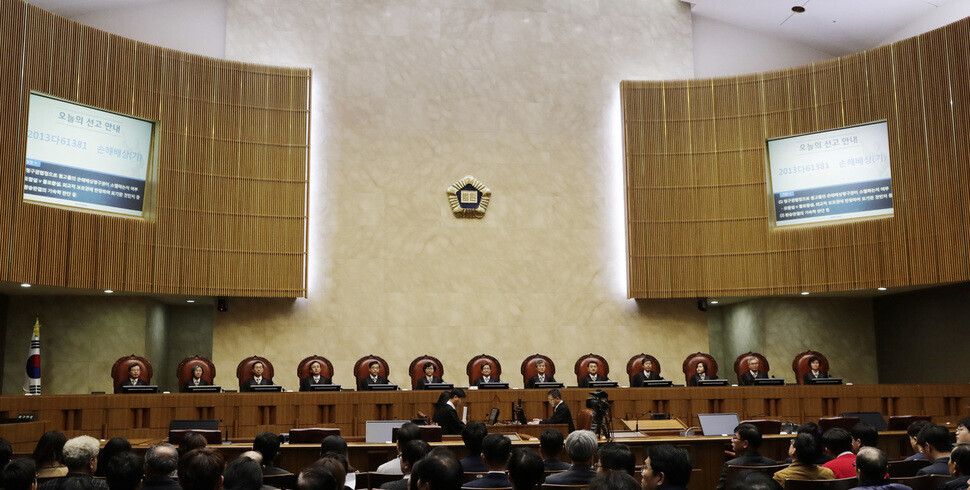hankyoreh
Links to other country sites 다른 나라 사이트 링크
[Editorial] Diplomacy between S. Korea and Japan is now more crucial than ever

Japanese Chief Cabinet Secretary Yoshihide Suga, a spokesperson for the Japanese government, said on Aug. 1 that Tokyo was “considering every available response measure” against the possible liquidation of the Korea-based assets of Japanese companies implicated in war crimes and forced labor conscription. While Suga didn’t mention any specific measures, Japanese news outlets have offered predictions such as increased tariffs on South Korean products, the suspension of wire transfers, and more stringent visa issuance conditions.
Suga’s remarks came as a South Korean court order to seize the South Korean assets of Nippon Steel -- one of the companies linked to war crimes -- is poised to take effect on Aug. 4. If the Japanese government does resort to that kind of response, South Korea-Japan relations are sure to be plunged into even greater turmoil. To avert that catastrophe, the two governments will need to reaffirm the principle of resolving issues through dialogue.
The liquidation of assets seized from Japanese companies implicated in war crimes has been described as a “ticking time bomb” for relations between Seoul and Tokyo. Senior officials in the Japanese government have been mentioning the possibility of retaliatory measures such as visa issuance restrictions and trade sanctions ever since the legal representatives of forced labor mobilization survivors applied last year to sell off assets from Nippon Steel and others. Last month, Japanese Foreign Minister Toshimitsu Motegi warned that this liquidation would “bring about a serious situation.”
The month of August harbors a number of factors that stand to act as variable in South Korea-Japan relations: the Japanese military comfort women memorial day on Aug. 14, National Liberation Day holiday on Aug. 15, and the Aug. 24 deadline for extending the two sides’ General Security of Military Information Agreement (GSOMIA). It’s unfortunate to see Suga speaking so incautiously and not giving any indication of willingness to resolve matters through dialogue at such a sensitive moment, where keeping bilateral ties on a stable footing is of crucial importance.
Diplomatic officials on both sides have agreed that the issue of liquidation and compensation of forced labor survivors should be resolved through dialogue, but no clear progress has yet been achieved. The reason has to do with the major difference in the two sides’ basic views of the situation. The Shinzo Abe administration has been criticized for deliberately escalating tensions with Seoul as a way of solidifying support among Japanese conservatives. Solving this problem will require it to respect the South Korean Supreme Court ruling and public opinion on both sides while seeking a diplomatic solution that is acceptable to all.
The South Korean court order for the seizure of 400 million won (US$335,009) in Nippon Steel assets in South Korea takes effect at 12 am on Aug. 4. With neither the Japanese Ministry of Foreign Affairs nor Nippon Steel cooperating with the case in South Korean court, the liquidation process for the stocks subject to the order is expected to take some time. This means there is still time left for diplomacy. Both governments need to keep their emotions in check and calmly explore solutions through different diplomatic channels.
Please direct comments or questions to [english@hani.co.kr]

Editorial・opinion
![[Editorial] Yoon must halt procurement of SM-3 interceptor missiles [Editorial] Yoon must halt procurement of SM-3 interceptor missiles](https://flexible.img.hani.co.kr/flexible/normal/500/300/imgdb/child/2024/0501/17145495551605_1717145495195344.jpg) [Editorial] Yoon must halt procurement of SM-3 interceptor missiles
[Editorial] Yoon must halt procurement of SM-3 interceptor missiles![[Guest essay] Maybe Korea’s rapid population decline is an opportunity, not a crisis [Guest essay] Maybe Korea’s rapid population decline is an opportunity, not a crisis](https://flexible.img.hani.co.kr/flexible/normal/500/300/imgdb/original/2024/0430/9417144634983596.jpg) [Guest essay] Maybe Korea’s rapid population decline is an opportunity, not a crisis
[Guest essay] Maybe Korea’s rapid population decline is an opportunity, not a crisis- [Column] Can Yoon steer diplomacy with Russia, China back on track?
- [Column] Season 2 of special prosecutor probe may be coming to Korea soon
- [Column] Park Geun-hye déjà vu in Yoon Suk-yeol
- [Editorial] New weight of N. Korea’s nuclear threats makes dialogue all the more urgent
- [Guest essay] The real reason Korea’s new right wants to dub Rhee a founding father
- [Column] ‘Choson’: Is it time we start referring to N. Korea in its own terms?
- [Editorial] Japan’s rewriting of history with Korea has gone too far
- [Column] The president’s questionable capacity for dialogue
Most viewed articles
- 1Months and months of overdue wages are pushing migrant workers in Korea into debt
- 2Trump asks why US would defend Korea, hints at hiking Seoul’s defense cost burden
- 3[Editorial] Yoon must halt procurement of SM-3 interceptor missiles
- 4At heart of West’s handwringing over Chinese ‘overcapacity,’ a battle to lead key future industries
- 5[Guest essay] Maybe Korea’s rapid population decline is an opportunity, not a crisis
- 6Fruitless Yoon-Lee summit inflames partisan tensions in Korea
- 7First meeting between Yoon, Lee in 2 years ends without compromise or agreement
- 8Under conservative chief, Korea’s TRC brands teenage wartime massacre victims as traitors
- 9Dermatology, plastic surgery drove record medical tourism to Korea in 2023
- 10[Column] Park Geun-hye déjà vu in Yoon Suk-yeol